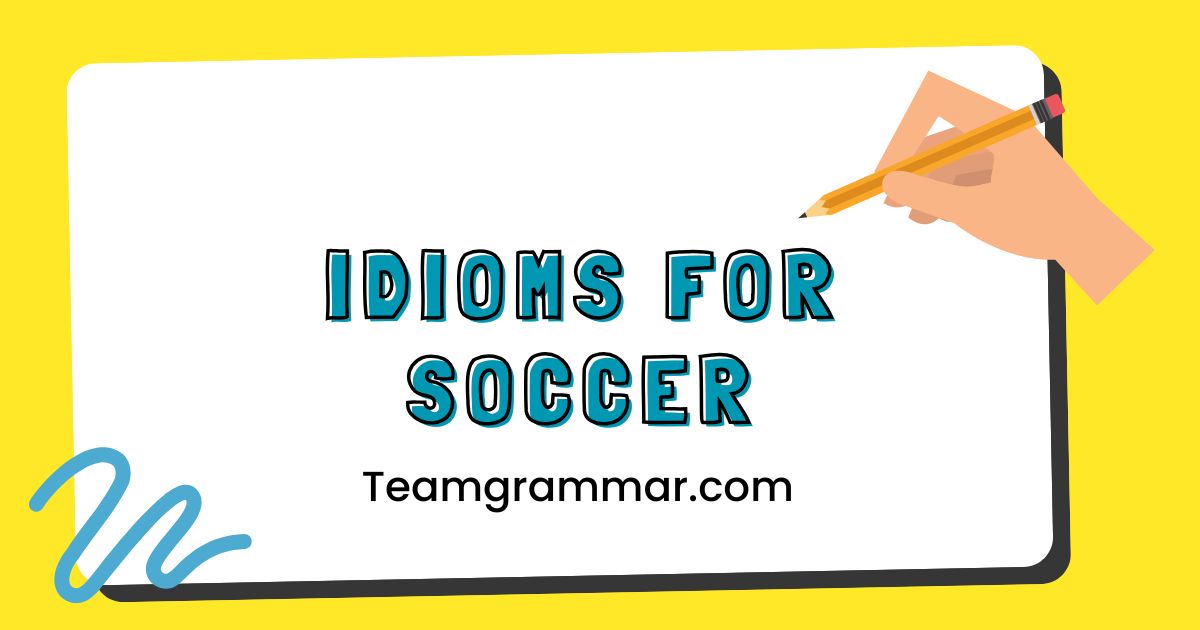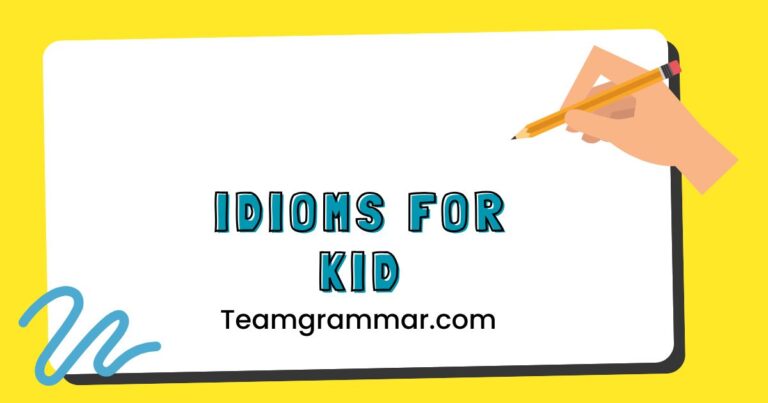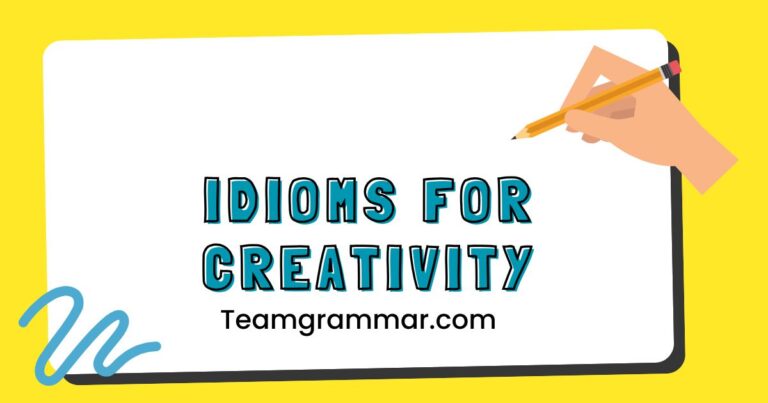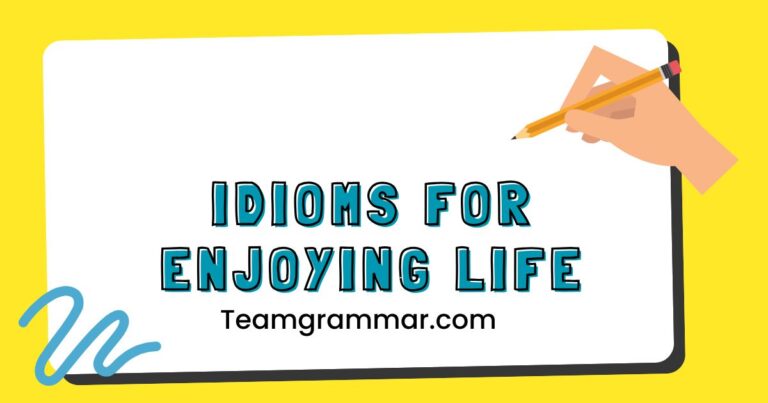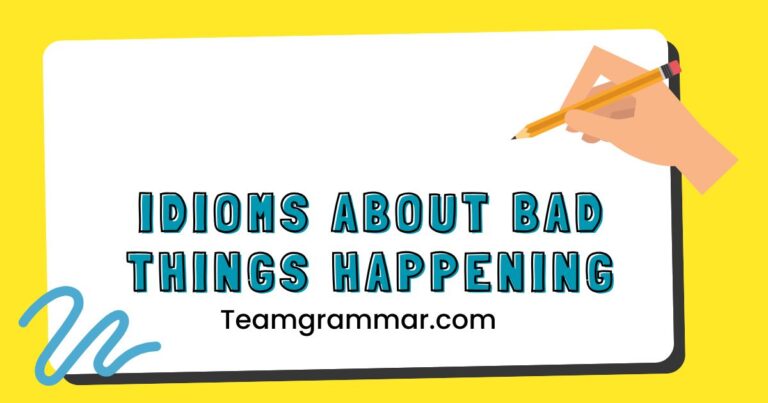36 Soccer Idioms: Mastering English Through the Beautiful Game
Understanding idioms is crucial for mastering English, and what better way to learn them than through the exciting world of soccer? Soccer idioms add color and nuance to everyday conversations, especially when discussing sports or teamwork.
This article explores common soccer-related idioms, providing definitions, examples, and practice exercises to help you confidently use them. Whether you’re a soccer fan or simply looking to improve your English, this guide will equip you with the knowledge to understand and use these idioms effectively.
This comprehensive guide is designed for English language learners of all levels, from beginners to advanced speakers. By the end of this article, you’ll not only understand the meaning of these idioms but also how to use them correctly in various contexts.
Get ready to score some language goals!
Table of Contents
- Introduction
- Definition of Idioms
- Structural Breakdown of Idioms
- Types and Categories of Soccer Idioms
- Examples of Soccer Idioms
- Usage Rules for Soccer Idioms
- Common Mistakes with Soccer Idioms
- Practice Exercises
- Advanced Topics: The Nuances of Soccer Idioms
- FAQ: Frequently Asked Questions
- Conclusion
Definition of Idioms
An idiom is a phrase or expression whose meaning cannot be understood from the ordinary meanings of the words within it. In other words, it’s a saying where the words together have a meaning that is different from the dictionary definitions of the individual words.
Idioms are a vital part of any language, adding richness and color to communication. They often reflect the culture and history of a language.
Idioms can be classified based on their structure, function, and context. Structurally, they can be phrasal verbs (e.g., “pass the buck”), prepositional phrases (e.g., “in the red”), or clauses (e.g., “it’s raining cats and dogs”).
Functionally, they can act as nouns, verbs, adjectives, or adverbs, depending on their role in a sentence. Contextually, idioms can be formal or informal, depending on the situation in which they are used.
Understanding idioms requires not just knowing the individual words but also understanding the cultural and historical context in which they are used. This is why idioms can be challenging for English language learners, but also rewarding to master.
Structural Breakdown of Idioms
Idioms, despite their seemingly arbitrary nature, often follow certain structural patterns. Recognizing these patterns can help learners better understand and remember idioms.
Here are some common structural elements found in idioms:
- Phrasal Verbs: Many idioms are based on phrasal verbs, which consist of a verb and a preposition or adverb (e.g., “kick off,” “mark up”).
- Binomials: These are idioms consisting of two words joined by a conjunction, often “and” (e.g., “rough and tumble”).
- Similes: Some idioms use similes to make comparisons, often using “like” or “as” (e.g., “as fit as a fiddle”).
- Metaphors: Many idioms are metaphorical, using figurative language to convey a meaning (e.g., “a level playing field”).
Understanding the structure of an idiom can provide clues about its meaning or origin. For example, recognizing that “kick off” is a phrasal verb can help learners understand that it involves action or initiation.
Types and Categories of Soccer Idioms
Soccer idioms can be categorized based on their meaning and usage. Here are some common categories:
Idioms Related to Starting a Game
These idioms refer to the beginning or initiation of an activity.
Idioms Related to Teamwork and Cooperation
These idioms emphasize the importance of working together to achieve a common goal.
Idioms Related to Success and Failure
These idioms describe achieving goals or experiencing setbacks.
Idioms Related to Strategy and Tactics
These idioms refer to planning and executing specific actions to gain an advantage.
Idioms Related to Pressure and Stress
These idioms describe situations where individuals or teams are under pressure to perform.
Examples of Soccer Idioms
Here are some examples of soccer idioms, categorized by their meaning and usage. Each example includes a definition and example sentence to help you understand how to use the idiom correctly.
Idioms Related to Starting a Game
The following table provides examples of idioms related to starting a game, including their meanings and example sentences.
| Idiom | Meaning | Example Sentence |
|---|---|---|
| Kick off | To start a game or event. | The meeting will kick off at 9 AM sharp. |
| Get the ball rolling | To start something; to initiate an activity. | Let’s get the ball rolling on this project by assigning tasks. |
| On the ball | Alert, competent, and quick to understand and react to things. | Our project manager is really on the ball; she anticipates problems before they happen. |
| Ahead of the game | To be further advanced or more successful than others. | By starting early, we are ahead of the game in terms of project completion. |
| Level playing field | A situation in which everyone has a fair and equal chance. | The new regulations will create a level playing field for all businesses. |
| Move the goalposts | To change the rules or requirements of a situation while someone is trying to do something. | Every time I think I’m close to finishing, they move the goalposts. |
| In the running | To have a chance of winning or being selected. | Despite the competition, our team is still in the running for the championship. |
| Take the lead | To be in front or in first place. | Our sales team has taken the lead in generating new revenue this quarter. |
| Call the shots | To be in charge; to make the decisions. | As the CEO, she calls the shots for the entire company. |
| Game plan | A strategy or plan of action. | Our game plan for the presentation is to start with a compelling story. |
| Start the ball rolling | To begin an activity or process. | To start the ball rolling, let’s define the project scope. |
| First off the bench | To be the first choice or most readily available person to take action. | When a problem arises, he’s always first off the bench to help solve it. |
| Set the pace | To establish the speed or standard for others to follow. | Our innovative products set the pace for the entire industry. |
| Lay the groundwork | To prepare the foundation for future success. | We need to lay the groundwork now to ensure a successful product launch. |
| Get off to a flying start | To begin something very successfully. | The company got off to a flying start with its new marketing campaign. |
| Take the field | To begin participating in an activity or competition. | The sales team is ready to take the field and close some deals. |
| On the front foot | To be proactive and assertive in an approach. | The company decided to be on the front foot with their new marketing campaign. |
| Take charge | To assume control or responsibility. | She decided to take charge of the project and lead the team to success. |
| Come out swinging | To start an activity aggressively and energetically. | The team came out swinging in the first quarter and quickly gained a lead. |
| Set the stage | To prepare the environment or conditions for something to happen. | The conference will set the stage for future collaborations and partnerships. |
| Out of the gate | From the very beginning. | The project was successful out of the gate, exceeding all expectations. |
Idioms Related to Teamwork and Cooperation
The following table provides examples of idioms related to teamwork and cooperation, emphasizing the importance of collaboration and shared effort.
| Idiom | Meaning | Example Sentence |
|---|---|---|
| Team player | Someone who works well with others to achieve a common goal. | He’s a great team player and always willing to help his colleagues. |
| Pass the buck | To avoid responsibility by shifting it to someone else. | No one wants to pass the buck when it comes to admitting mistakes. |
| One-two punch | A combination of two effective actions or strategies. | The marketing team used a one-two punch of social media and email campaigns. |
| Move as a unit | To act together in a coordinated and unified manner. | To achieve success, the team must move as a unit. |
| Touch base | To make contact with someone to exchange information. | Let’s touch base next week to discuss the project’s progress. |
| Cover each other | To support and protect each other’s interests. | In a strong team, members always cover each other‘s backs. |
| In tandem | Working together at the same time and in the same way. | The two departments worked in tandem to streamline the process. |
| On the same page | To have a shared understanding or agreement on something. | Before we start, let’s make sure everyone is on the same page. |
| Carry the ball | To take responsibility for a task or project. | She’s willing to carry the ball on this project and see it through to completion. |
| All hands on deck | Everyone is needed to help with a task or problem. | With the deadline approaching, it’s all hands on deck to get the project finished. |
| Play as a team | To work together effectively to achieve a common goal. | The key to success is to play as a team and support each other. |
| Synergy | The combined power of a group of people when they are working together that is greater than the total power achieved by each person working separately. | The synergy between the marketing and sales teams resulted in record-breaking revenue. |
| Shoulder to shoulder | Side by side; working together in close cooperation. | The team worked shoulder to shoulder to overcome the challenges. |
| Pull together | To work together to achieve a common goal, especially in a difficult situation. | In times of crisis, it’s important to pull together and support each other. |
| Take one for the team | To make a sacrifice for the benefit of the group. | He was willing to take one for the team and work overtime to meet the deadline. |
| Two heads are better than one | Two people working together can solve a problem more easily than one person working alone. | Let’s brainstorm together; after all, two heads are better than one. |
| In concert | Acting together in harmony. | The various departments worked in concert to achieve the company’s goals. |
| Contribute | To give something, especially money or time, to help a person, group, organization, or cause. | Every member of the team is expected to contribute their unique skills and talents. |
| Collective effort | A joint effort by a group of people. | The project’s success was due to the collective effort of the entire team. |
| Harmony | A state of agreement or peaceful existence. | The team worked in harmony, respecting each other’s opinions and ideas. |
Idioms Related to Success and Failure
Here’s a table that presents idioms about success and failure. These idioms are crucial for describing outcomes, achievements, and setbacks in various contexts.
| Idiom | Meaning | Example Sentence |
|---|---|---|
| Score a goal | To achieve a success or desired outcome. | Our marketing campaign scored a goal by significantly increasing sales. |
| Own goal | An action that unintentionally harms one’s own interests. | His impulsive decision turned out to be an own goal for his career. |
| Win the game | To be successful; to achieve victory. | By focusing on customer satisfaction, we can win the game in the long run. |
| Game over | The end of a situation, often with negative consequences. | When the company lost its biggest client, it was game over. |
| Neck and neck | Very close in a competition or race. | The two candidates are neck and neck in the polls. |
| Come from behind | To recover from a losing position to win. | The team managed to come from behind and win the championship. |
| Back of the net | A successful outcome or achievement. | Getting the contract signed was truly back of the net for our company. |
| Offside | In a disadvantageous or unfair position. | He felt he was being treated offside by his colleagues. |
| Underdog | A person or team expected to lose. | The small startup was the underdog in the competitive market. |
| Hail Mary | A last-ditch effort with little chance of success. | His proposal was a Hail Mary, but it miraculously worked. |
| Knockout punch | A decisive action that ends a competition or struggle. | The new product feature was the knockout punch that beat the competition. |
| In the lead | Being in a position of advantage or dominance. | Our company is in the lead in terms of market share. |
| At the top of your game | Performing at your best. | She’s at the top of her game, consistently exceeding expectations. |
| On the ropes | In a difficult or losing situation. | The company was on the ropes after the financial crisis. |
| Win by a landslide | To win overwhelmingly. | The candidate won the election by a landslide. |
| Narrow victory | A win achieved by a small margin. | The team secured a narrow victory in the final seconds of the game. |
| Blow the whistle | To report wrongdoing or illegal activity. | He decided to blow the whistle on the company’s unethical practices. |
| Call a foul | To point out an unfair or inappropriate action. | The referee had to call a foul on the player’s aggressive tackle. |
| Drop the ball | To make a mistake or fail to fulfill a responsibility. | He dropped the ball by missing the important deadline. |
| Behind the eight ball | In a difficult or disadvantageous situation. | Starting the project late put us behind the eight ball. |
Usage Rules for Soccer Idioms
Using idioms correctly requires understanding their nuances and context. Here are some key rules to follow:
- Context is Key: Always consider the context in which you are using the idiom. Some idioms are more appropriate for formal settings, while others are better suited for informal conversations.
- Know Your Audience: Be mindful of your audience’s familiarity with idioms. If you are speaking to non-native English speakers, it may be best to avoid using idioms altogether, or to explain them when you do.
- Don’t Overuse Idioms: Using too many idioms can make your speech sound unnatural or contrived. Use them sparingly and only when they add value to your communication.
- Use Correctly: Make sure you understand the meaning of the idiom before using it. Using an idiom incorrectly can lead to confusion or miscommunication.
Common Mistakes with Soccer Idioms
One of the common mistakes is taking idioms literally. Because idioms have figurative meanings, interpreting them word-for-word can lead to misunderstandings.
Another frequent error is using idioms in the wrong context, such as employing informal idioms in formal settings. Additionally, some learners misuse idioms by altering their wording, which can change or obscure their intended meaning.
Here are some examples of common mistakes and how to correct them:
| Incorrect | Correct | Explanation |
|---|---|---|
| “He kicked the bucket.” (Intended to mean “He started the project.”) | “He kicked off the project.” | “Kicked the bucket” means “to die,” not to start something. |
| “Let’s move our goals.” | “Let’s move the goalposts.” | The correct idiom is “move the goalposts,” not “move our goals.” |
| “She passed me the deer.” | “She passed the buck.” | The correct idiom is “pass the buck,” not “pass me the deer.” |
| “He’s playing in the same book.” | “He’s on the same page.” | The correct idiom is “on the same page,” not “in the same book.” |
| “They scored the target.” | “They scored a goal.” | The correct idiom is “score a goal,” not “score the target.” |
Practice Exercises
Test your understanding of soccer idioms with these exercises. Fill in the blanks with the correct idiom from the list provided.
Idiom List: kick off, get the ball rolling, on the ball, ahead of the game, level playing field, move the goalposts, team player, pass the buck, score a goal, game over
| Question | Answer |
|---|---|
| 1. Let’s __________ by introducing ourselves. | get the ball rolling |
| 2. The meeting will __________ at 10 AM sharp. | kick off |
| 3. Our new intern is really __________; she learns quickly. | on the ball |
| 4. By starting our preparations early, we are __________ in the competition. | ahead of the game |
| 5. The new regulations will create a __________ for all businesses. | level playing field |
| 6. Every time I think I’m about to finish, they __________. | move the goalposts |
| 7. He is a great __________ and always helps his colleagues. | team player |
| 8. No one wants to __________ when things go wrong. | pass the buck |
| 9. Our marketing campaign __________ by increasing sales significantly. | score a goal |
| 10. When the company lost its biggest client, it was __________. | game over |
Exercise 2: Match the idiom with its meaning.
| Idiom | Meaning | Answer |
|---|---|---|
| 1. Drop the ball | a. To be very close in a competition | 1-d |
| 2. Neck and neck | b. To be in a difficult situation | 2-e |
| 3. Behind the eight ball | c. To start something aggressively | 3-f |
| 4. Ahead of the game | d. To make a mistake | 4-g |
| 5. Take one for the team | e. Very close in a competition | 5-h |
| 6. Come out swinging | f. In a difficult or disadvantageous situation | 6-c |
| 7. Win by a landslide | g. To be further advanced or more successful than others. | 7-i |
| 8. At the top of your game | h. To make a sacrifice for the benefit of the group. | 8-j |
| 9. A level playing field | i. To win overwhelmingly. | 9-a |
| 10. On the ball | j. Performing at your best. | 10-b |
Advanced Topics: The Nuances of Soccer Idioms
For advanced learners, understanding the nuances of soccer idioms involves exploring their cultural origins, historical context, and subtle variations in meaning. Many idioms have evolved over time, and their meanings can vary depending on the region or dialect.
Additionally, some idioms may have multiple interpretations or connotations, requiring a deeper understanding of the language and culture to use them effectively.
For example, the idiom “move the goalposts” can be used in both positive and negative contexts, depending on the situation. In some cases, it may refer to adapting to changing circumstances, while in others, it may refer to unfairly changing the rules.
Similarly, the idiom “team player” can have different connotations depending on the team and its culture. In some teams, it may refer to someone who is cooperative and supportive, while in others, it may refer to someone who is willing to sacrifice their own goals for the benefit of the team.
FAQ: Frequently Asked Questions
- What is an idiom?
An idiom is a phrase or expression whose meaning cannot be understood from the ordinary meanings of the words within it. It’s a saying where the words together have a meaning that is different from the dictionary definitions of the individual words.
- Why are idioms important in English?
Idioms add color and nuance to the English language. Understanding idioms is crucial for comprehending everyday conversations, literature, and media. They also provide insights into the culture and history of the language.
- How can I learn idioms effectively?
The best way to learn idioms is through exposure and practice. Read books, watch movies, listen to podcasts, and pay attention to how native speakers use idioms in their conversations. Keep a notebook of new idioms and practice using them in your own speech and writing.
- Are idioms the same in all English-speaking countries?
No, idioms can vary depending on the region or dialect. Some idioms are specific to certain countries or regions, while others are more widely used. Be aware of these variations and use idioms that are appropriate for your audience.
- Can I create my own idioms?
While it’s possible to create new expressions, they won’t be considered idioms until they are widely adopted and understood by native speakers. Idioms typically evolve over time and become part of the common language.
- Is it okay to use idioms in formal writing?
It depends on the context and the specific idiom. Some idioms are more formal and appropriate for academic or professional writing, while others are informal and better suited for casual conversations. Use your judgment and consider your audience when deciding whether to use an idiom in formal writing.
- What should I do if I don’t understand an idiom?
If you encounter an idiom that you don’t understand, ask for clarification or look it up in a dictionary or online resource. Pay attention to the context in which the idiom is used, as this can provide clues about its meaning. Don’t be afraid to ask for help if you’re unsure.
- How do I avoid misusing idioms?
To avoid misusing idioms, make sure you understand their meaning and usage. Practice using them in different contexts and get feedback from native speakers. Be mindful of your audience and use idioms that are appropriate for the situation.
- Are there any resources that can help me learn idioms?
Yes, there are many resources available to help you learn idioms, including dictionaries, textbooks, websites, and language learning apps. Look for resources that provide definitions, examples, and practice exercises to help you master idioms effectively.
Conclusion
Mastering soccer idioms can significantly enhance your understanding and use of the English language. By learning these colorful and expressive phrases, you can communicate more effectively and connect with native speakers on a deeper level.
Remember to consider the context, know your audience, and practice using idioms correctly to avoid common mistakes.
Continue to explore new idioms and incorporate them into your daily conversations. With consistent effort and practice, you’ll be scoring language goals in no time!
Embrace the challenge and enjoy the journey of learning English through the exciting world of soccer.

